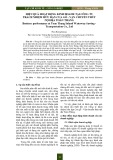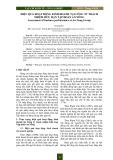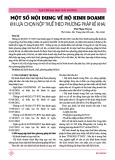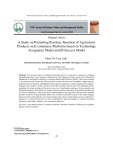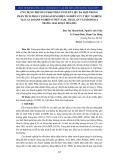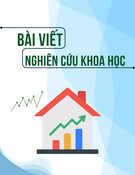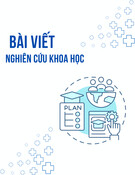
VNU Journal of Science: Economics and Business, Vol. 35, No. 5E (2019) 60-71
60
Original Article
Which Skills SME Managers Need to Enter Foreign Markets:
An Imperial Study in Vietnamese Agricultural SMEs
Le Tien Dat*
Thuongmai University, No.79 Ho Tung Mau, Mai Dich, Cau Giay, Hanoi, Vietnam
Received 03 December 2019
Revised 126 December; Accepted 26 December 2019
Abstract: In the coming years, Vietnamese agricultural enterprises, many of which are SMEs, are
looking forward to numerous development opportunities. In particular, the Comprehensive and
Progressive Agreement for Trans-Pacific Partnership (CPTPP) has officially came into effect,
opening up great opportunities for the export of agricultural, forestry and fishery products into an
extremely large and promising market. However, doing business in the foreign markets, which
contain a lot of risks, is not easy for SMEs. Among issues that Vietnamese agricultural export
SMEs are facing, poor management capacity is seen as the one of the key constraints. This paper
investigates the training needs of Vietnamese agricultural SME managers with regard to skills they
need to penetrate international markets. To investigate training needs of Vietnamese SME
managers, qualitative methodology with the participation of 124 Vietnamese SME managers was
used. A series of market entry skills was emphasized such as those that help to analyze markets, to
develop new markets, to get better understanding about potential/ target/ traditional markets. The
research results are expected to be useful for SMEs and training/consulting institutions as well as
government agencies in developing training programs to support Vietnamese SMEs in exporting
agricultural products. The paper also makes a contribution in developing the body of knowledge
related to human resource management in emerging markets such as Vietnam.
Keywords: Vietnam, agricultural product export, technical barriers, management capacity, market
entry skill.
1. Introduction *
SMEs play an important role in the
agricultural export of developing countries,
particularly when these countries have
increasingly participated in the global supply
_______
* Corresponding author.
E-mail address: Tiendatle1509@gmail.com
https://doi.org/10.25073/2588-1108/vnueab.4285
chain. In fact, the contribution of Vietnamese
SMEs to agricultural export is still insignificant,
and mainly through indirect export. However,
thanks to technology innovation and
e-commerce advancement, the potential of
Vietnamese agricultural SMEs to join in direct
export has been on the increase. Vietnamese
agricultural export SMEs have also received
more and more support from the government in
their business activities.

L.T. Dat / VNU Journal of Science: Economics and Business, Vol. 35, No. 5E (2019) 60-71
61
In the process of seeking foreign markets,
Vietnamese agricultural SMEs have faced a lot
of challenges with regard to the fluctuations of
foreign markets, cultural differences, business
risks in international markets, and particularly,
technical barriers set by importing countries to
limit the volume of imported agricultural
products. Due to the shortage of finance,
technology, and especially human resources,
Vietnamese SMEs always find it hard to
overcome such difficulties to get better success
in export. This paper, therefore, aims to develop
training programs to support Vietnamese
SMEs, based on their actual needs related to
skills to penetrate foreign markets.
2. Literature review
2.1. Training and training needs identification
In SMEs, the innovation of the management
team is strongly important [1]. Jenny and
Escriba-Esteve et al. also emphasize that the
flexibility and readiness for innovation in SMEs
is greatly affected by the management capacity,
especially that of the senior management team,
in all business activities and stages in the
enterprise [2, 3]. The important mission of
being the decision-making team and responsible
for strategic and vital decisions for the
development of SMEs [4, 5] and their
management capacity, along with other factors
such as the cooperative working environment,
which encourages and recognizes multi-
dimensional views and opinions in enterprises,
has a great impact on the innovation
effectiveness in particular and on the
performance of SMEs in general [6]. Previous
studies such as that of Kearney et al. also
emphasize that management capacity is directly
linked to the performance, innovation and
development of SMEs. Management capacity
strongly affects the use of enterprise resources,
on the innovation and cooperation among
enterprise members [7].
Lee, Spector et al. (963) define training by
emphasizing the improvement of skills through
training. Accordingly, training is understood as
“instruction intended to improve performance
or support learning of a specific level of
knowledge & skill required to perform some
aspect of a job or task” [8, 9]. Training has
always been seen as an extremely important
activity in human resource management as it
relates to the ability to improve performance for
both businesses and individuals, through
significant improvements in behaviors in the
workplace [10-16].
Training activities for managers have some
specific characteristics, especially those for
SME managers. Gerber emphasizes that SMEs
are often formed by experts who are
“technically proficient” in certain areas. For
example, a person who is good at accounting,
or a skilled carpenter, may be very good in his
field, but often lacks management knowledge
and experience. They can do their job very well
at a master level, but they are seldom assigned
to a management job, and do not often show
initiative to equip themselves with management
knowledge. Both the management experience
and management skills of many SME managers
are lacking and weak. Therefore, they easily
encounter troubles related to management when
operating businesses. Such problems become
more serious when their businesses develop and
expand. At that moment, SME managers are not
capable of managing, due to a lack of
knowledge and skills. A low level of
management can be accompanied by a series of
other weaknesses, easily resulting in the failure
of the enterprise [17].
According to Huang, the training process
consists of particular stages, such as
investigating and identifying training needs,
designing plans for training, devising training
objectives, selecting methods to deliver
training, conducting training programs,
evaluating results of training, and documenting
training records [18]. Mayfield also shared the
view with Huang when identifying stages of
training process, including Analysis, Design,
Development, Implementation and Evaluation
(ADDIE model), in which training needs
analysis aims to set up training goals. In other
words, the outcomes of skills, knowledge, and

L.T. Dat / VNU Journal of Science: Economics and Business, Vol. 35, No. 5E (2019) 60-71
62
abilities which trainees are expected to gain are
created in this step [18, 19].
Historically, training needs analysis may be
seen as the phase or tool by which the training
content is determined. According to Tracey
(2004), training needs analysis is defined as:
“The first step in the training process, designed
to identify performance gaps that can be
remedied by training. It consists of surveillance,
investigation and data analysis” [20].
Pratik emphasizes training needs analysis as
an important basis for the entire training
process (skill/knowledge/attitude
improvement), as well as the development
process (focus on development for the future
business). Accordingly, training needs analysis
helps managers to have an overall view of the
organization and business activities as well as
problems that enterprises are facing and
possible solutions to turn challenges into
success by applying training. Besides, this
activity helps analyze the needs of both
businesses and individuals in the organization,
at different levels, to develop training and
development solutions in order to improve
operational efficiency. Organizations and
individuals, based on the outcomes of training
needs analysis, may develop appropriate plans
for both training and development. Solutions
may not only be related to training but also to
other supports to enhance the overall
operational capacity of the whole enterprise.
The analysis of new requirements such as those
from technology advancement or new barriers
in the markets should also be considered in the
process of training analysis [21].
2.2. Training needs with regard to market
entry skills
An inadequate understanding of overseas
markets and the shortage of information to
analyze markets are identified as major barriers
for SMEs in international business [22]. When
entering foreign markets, many current and
potential exporters find that because of a
shortage of information, they encounter
difficulties in identifying foreign business
opportunities by locating, analyzing and
selecting foreign markets, as well as in making
contact with potential customers in international
markets [23, 24]. Such information is obviously
helpful in reducing the uncertainty in an
international business environment. Many
exporting problems can be solved if managers
have the ability to effectively use relevant,
accurate and timely information. In contrast, if
the manager lacks the knowledge that this
information provides, the unfamiliarity and
uncertainty of doing business in international
markets may increase [22].
An inability to collect, disseminate and use
export market information is believed to have a
detrimental impact on the export performance
of a firm. Toulova, Votoupalova and
Kubickova argued that the obtaining of relevant
market information prior to entry determines
the success of SMEs in internationalization
[25]. However, Czinkota and Ronkainen
indicated that in searching the data required for
market investigation, there could be problems
with regard to the source, the comparability,
and especially the quality of the information
needed. For example, the data might be
inaccurate, outdated or incomplete. In addition,
the constraints of time, resources and expertise
may be major factors that inhibit SME
managers from adequately investigating
international markets [26].
Authors such as Javidan, Teagarden and
Bowen; Nordstrom and Kleiner; and Yu et al.
have stated that foreign market entry skills are
one of the most important for managers who
wish to conduct international business [27-29].
According to Javidan, Teagarden and Bowen,
managers in the international context are
required to have effective international business
knowledge to expand their business. Further,
they need adequate understanding about
behaviors of customers and the strategies of
rivals in foreign markets [27]. In addition,
Nordstrom and Kleiner highlighted that
international managers also need skills to
effectively access overseas markets. The
managers should have skills that not only
address benefits and market attractiveness, but

L.T. Dat / VNU Journal of Science: Economics and Business, Vol. 35, No. 5E (2019) 60-71
63
also any risks and threats of potential foreign
markets. In addition, these managers need to
conduct and investigate market dynamics to
predict the direction their companies should
take, as well as to develop relationships with
foreign partners and to seek opportunities [28].
A good understanding of international trade
practices was also deemed important
for international managers in the study of
Yu et al [29].
2.3. Vietnamese agricultural SMEs
in internationalization
Vietnam’s agricultural export has had many
prosperous developments due to increased
market demand, improved product structure,
high technology application and tax incentives,
which encourages the cooperation and
investment in agriculture. The leading driving
force for agricultural export development
comes from the integration process, as well as
the agricultural restructuring towards higher
value-added and sustainable development,
promoting the linkage of stakeholders and
increasing investment and the application of
high technology in agriculture [30].
A great number of Vietnamese agricultural
products, especially Vietnamese fruits, are
increasingly present in fastidious markets,
which in turn requires much better quality.
Capability of entering difficult markets is
expected to bring "double benefits" by avoiding
the dependence of agricultural products on one
market and helping farmers change habits and
production methods, moving from “selling what
you have” to “selling what the market needs”.
This is also an indispensable direction that
agricultural enterprises should follow in the
context that Vietnam is becoming increasingly
integrated into the world market. Currently, the
US has allowed a series of Vietnamese fruits to
be imported, namely white and red flesh
dragonfruit, rambutan, longan and lychee
(requires irradiation) and is continuing to
complete procedures to allow importing of
mango and star apple fruit. Not only in the US
market but in many other fastidious markets
such as Australia, Japan, Korea, New Zealand
and especially Europe... Vietnam’s export fruits
have increased in both quantity and value [31].
In the coming years, Vietnamese
agricultural products and enterprises, many of
which are SMEs, are looking forwards to many
opportunities. In particular, the CPTPP
Agreement officially came into effect, opening
up great opportunities for the export of
agriculture, forestry and fishery products into
an extremely large and promising market.
However, the quality of agricultural products of
Vietnamese enterprises, especially those of
SMEs that meet international quality standards
for export growth, is another issue. Generally,
the capacity of Vietnamese SMEs to meet the
strict requirements of the international market is
very limited. A key reason for this problem is
that Vietnam's agriculture is still small. In
addition, the product quality is inconsistent, the
chain production organization is not effective,
the response to the quality, labor and
intellectual property standards proposed by the
CPTPP is very low. In this situation, supports
related to the technology application and human
resources are strongly needed. With limitations
of resources and the shortage of foreign
investment, SMEs desperately need support
from the government. Solving a range of
problems such as applying a good agricultural
practice standard, GAP standard or a HASAP
standard requires government support policies
to raise awareness and gradually accumulate
resources to meet these standards [32].
3. Research methodology
3.1. Research objectives
Based on the literature related to training
and training needs and market entry skills
needed in internationalization, this paper aims
to explore the training needs of Vietnamese
Agricultural SMEs to “go global”. Therefore,
perceptions of Vietnamese agricultural SME
managers with regard to market entry skills
needed to export their products were first

L.T. Dat / VNU Journal of Science: Economics and Business, Vol. 35, No. 5E (2019) 60-71
64
investigated. Subsequently, implications related
to relevant training programs are then provided.
Research outputs are expected to be beneficial
to SME managers and training/consulting
institutions in assisting Vietnamese SMEs to
expose their agricultural products to
overseas markets.
The following main research question has
been investigated and guides this study:
What are the perceptions of Vietnamese
agricultural SME managers with regard to
market entry skills needed in
internationalization?
The interview protocol was developed
based on the literature related to market entry
skills needed in business integration. The
similarities and differences among perceptions
of SME managers were examined, which
assisted the researcher in analyzing
qualitative data.
Questions in the interview protocol were set
to seek the perceptions of Vietnamese
agricultural SMEs with regard to skills to enter
foreign markets, such as those to help managers
research markets, develop new markets, adapt
to market fluctuations, or better understand
potential/target markets. Not only were main
questions set in the protocol, but also probing
questions were provided to interviewees, based
on new ideas arising during the interviews.
3.2. Data collection
According to Saunders, Lewis and
Thornhill, in studies where the perceptions of
participants are investigated, the qualitative
method should be used [33]. In the study on
training needs with regard to market entry skills
of Vietnamese agricultural SMEs, using semi-
structured questions assisted the researcher in
obtaining a deeper understanding of the skills
that Vietnamese SME managers need to
internationalize their agricultural products.
Numerous opinions of SME managers were
shared, which supported the researcher in
developing qualitative data in both breadth and
depth [33, 34].
One hundred and twenty-four (124)
Vietnamese SME managers operating in the
agricultural business field agreed and joined
this research. These managers come from
different provinces in the north of Vietnam. The
relevance comments of government officials are
also sought in this study. The qualitative data
were collected during the period between
December 2018 and May 2019.
The qualitative interview questions were
sent to participants by various methods. For
managers who agreed to join face-to-face
interviews, the interviewer asked interviewees
to set the location and time appropriate to the
interviewee. For those who preferred to answer
via email or write on the print interview
protocol, emails and print copies were sent to
them. Based on the answers of participants
collected in various interview methods, the
researcher conducted a process of data analysis.
For interviews conducted by face-to-face
interview, the audio files were then transcribed
for analyzing data.
3.3. Data analysis
In this study, the step-by-step qualitative
data analysis procedure suggested by Creswell
was used to systemize the data. Accordingly,
the researcher organizes the data, conducts a
preliminary read-through of the databases,
codes, and organizes the data in the format for
interpretation. The qualitative QSR support
software Nvivo was used in the process of data
analysis [35].
4. Results
4.1. Training needs on market entry skills
perceived by Vietnamese agricultural SMEs
In this section, the training needs perceived
by Vietnamese agricultural SMEs to
internationalize business, particularly to
overcome technical requirement barriers are
investigated and presented. Each participant
was coded and the description on interviewee




![Tài liệu học tập Thực tập mô phỏng chiến lược [chuẩn nhất]](https://cdn.tailieu.vn/images/document/thumbnail/2025/20250716/vijiraiya/135x160/280_tai-lieu-hoc-tap-thuc-tap-mo-phong-chien-luoc.jpg)
